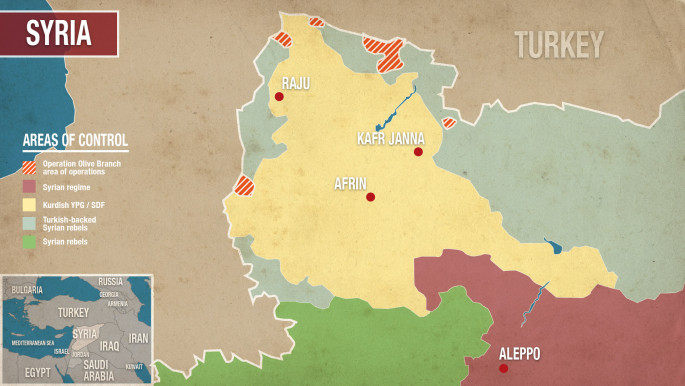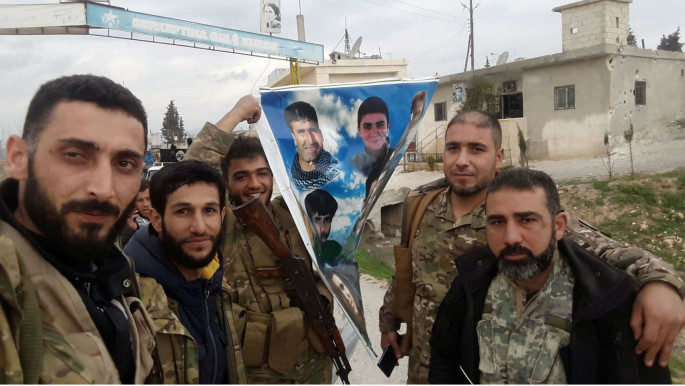Afrin battle: Kurdish self-rule in northwest Syria 'enters its final days'
It marked the last desperate act of the Kurdish militia in control of Afrin for much of Syria's war and a final admission that resistance to a Turkish planned offensive had not gone to plan.
Over the past three days, more than 200,000 people have fled Afrin through corridors out of the city. This was part of a plan by the Turkish-rebel force to allow civilians to escape, as they tightened their stranglehold over Afrin.
If YPG fighters do not surrender soon, then Syrian rebel sleeper cells are expected to take control of the city's main administration buildings before the larger force outside the city moves in, Syrian rebel commanders have told The New Arab.
Turkey's plan from the start has been to encircle Afrin and allow civilians and Kurdish fighters to escape, to ensure the assault on the city is not a bloody one for either side. The beginning of the end in Turkey's Syria campaign now appears imminent.
"We will enter in two days," one rebel fighter told The New Arab.
 |
Turkey's plan from the start has been to encircle Afrin and allow civilians and Kurdish fighters to escape, to ensure the assault on the city is not a bloody one for either side |  |
New front
Given the twists and turns of Syria's war - which marked its seven-year anniversary on Saturday - it is perhaps unsurprising that a new front should open up in the country earlier this year.
Syria's Afrin was a natural location for this new theatre of conflict. While the Kurdish-controlled canton straddled the Turkish border, the city itself was just a short distance from Aleppo, Syria's largest city. Surrounding the Kurdish enclave are key regime and opposition territories.
When Bashar al-Assad's forces withdrew from Afrin in 2012, the canton became one of the first testing grounds for Kurdish autonomy and soon a stronghold for the People's Protection Units (YPG) militia.
This inevitably put it in the scopes of a wary Turkey, nervous about its own large, restive Kurdish population. The ultimate aim of the Ankara-led invasion of Afrin has been to extinguish the Kurdish experience in self-rule and secure the borders from the YPG, which Turkey insists is part of the anti-Ankara Kurdistan Workers Party (PKK) militia.
The campaign could also bolster the position of pro-Turkish opposition groups in northern Syria just as the rebel resistance collapses elsewhere in the country.
Turkish intervention
Ankara has repeatedly threatened to take military action against the Kurdish insurgency on its borders, having already fought a decades' long campaign against the PKK.
The first direct Turkish intervention against YPG was with Euphrates Shield offensive in northern Syria in 2016.
Late January 2018, thousands of Syrian rebel fighters crossed into Syria, backed by Turkish armour and aircraft, to capture the YPG territories in northwest Syria.
The campaign has forced tens of thousands of civilians from their homes, who have joined the millions of other refugees created by Syria’s war.
 |
The campaign has forced tens of thousands of civilians from their homes, who have joined the millions of other refugees created by Syria’s war |  |
Many of the Afrin villagers have attempted to reach the larger Kurdish-controlled territories to the east, through a corridor controlled by the Syrian regime. Those unable to reach Manbij have headed to the hills or YPG-controlled neighbourhoods in Aleppo.
Kurdish fighters have gone the other way, bolstering Afrin's defences but it appears with little success as the western YPG presence collapses.
Invaders or liberators?
It is ironic that one factor for Ankara's invasion in Syria has been to bolster its "safe zones" idea, that would allow Syrian refugees living in Turkey to return back to their native country.
 |
| [click to enlarge] |
Kurdish-dominated Afrin will prove more of a challenge for Turkey to hold than the Arab towns of Jarabalus and al-Bab that were seized from the Islamic State group during the Euphrates Shield offensive.
Although many of Afrin's Kurdish-majority were likely intimidated by the YPG's clumsy, often thuggish, attitude towards the civilian population they are also wary of the incoming Syrian rebel fighters who mostly come from outside the canton.
Almost completely Arab in composition, the fighters in the rebel force come from other areas of Syria such as Hama. Some come from Hassakeh and Aleppo, where the YPG expelled - or assisted the regime - in crushing earlier rebel uprisings.
"There was no pressure on us to join the Operation Olive Branch (Turkish offensive), as we are from Hama. Turkey sent an open letter to all (rebel) groups asking for volunteers," said one rebel officer.
"I don't hate Kurds and I don't like the YPG, but in reality I don't care much about them neither."
The campaign has given Syrian rebel fighters living as refugees in Turkey a source of pride, hope and money, they say.
"The Free Syrian Army (FSA) is losing support and we can't fight against Bashar (al-Assad). The war is almost over, how can we survive living off humanitarian aid? I didn't fight for five years to sit at home in Turkey and do nothing. I need this work."
Although most rebel fighters have conducted themselves well in the campaign, many of them experienced the horrific regime assault on rebel-held Eastern Aleppo in 2016. This was aided by the YPG and there is an appetite among some of the fighters for revenge.
 |
| Rebel fighters in Afrin canton [HMOC] |
Syrian regime militias briefly entered Afrin to help bolster the YPG defences, but following a rapid Turkish advance they fled given the fears of reprisals.
Turkey has tried to avoid a head-on bloody battle with the defenders in the city, which might undo much of Ankara's successes in the campaign.
Sources are generally united in the consensus that the Turkish force will continue their siege until the YPG surrender or sleeper cells capture key positions from inside. This could be a matter of hours or days.
"God willing, we will be able to free the city of Afrin, but that can't be determined in only few days or weeks. It takes more patience, and unfortunately foreign policy," said Mahmoud, another rebel fighter, referring to the complicated power-play in northern Syria between Turkey, the US and Russia.
What next?
As well as crushing Kurdish militancy in northern Syria the campaign will also give the Syrian opposition a new foothold in the north. Turkish occupation in other areas, such as al-Bab, have bolstered security and enabled normal economic activity to resume.
Rebel control of Afrin will end YPG roadblocks in the area that have frustrated and exploited traders and civilians travelling across the canton for many years.
The campaign has also linked the FSA-held town of Azaz with rebel-held Idlib and will allow for freer trade between Turkey and rebel areas in northern Syria.
Turkey could still expand its observation posts deeper into Idlib, which might prevent new regime assaults on the territories.
Despite repeated warnings by Erdogan, Turkey is unlikely to assault Syrian Democratic Forces in Manbij - further to the east - as it would put them on a collision course with NATO ally US.
They might also avoid attacking territories controlled by regime militias that are backed by Russia, such as Menagh airbase and Tal Rifaat.
Syrian rebel fighters said they will be happy to take part in future Turkish campaigns, which will likely see the mopping up of the last YPG-controlled territories in northwest Syria.
Turkey's position in Syria will allow it to control the flow of resources, food and other goods between Aleppo and Idlib.
Control of three well-fortified mountains overlooking the major "M-214" Turkey-Damascus highway will likely be used as a bargaining chip with the regime in future negotiations.
"There's no going back, we will secure the entire region of Afrin, all the hills, former YPG bases, roads will be held by the national army and open the road between Idlib and Azaz," said Abu Sulejman, another Syrian rebel commander.
But the presence of super-powers in northern Syria means the battle for Afrin is likely the last one for many of these rebel fighters.





 Follow the Middle East's top stories in English at The New Arab on Google News
Follow the Middle East's top stories in English at The New Arab on Google News


